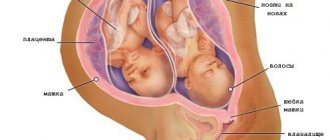First movements
Question: “When will the baby start moving in my tummy?”, almost every gynecologist hears several times a day. Yes, this is indeed the most frequently asked question of all pregnant women.
We will try to answer it as fully as possible, and then you will not have to pester your doctor with extraneous questions that have nothing to do with your birth history.
If we talk about the physiological mobility and movement of the child, then the baby makes the first movement already at the 8th week of pregnancy from conception, or it is 10-11 weeks of obstetric pregnancy.
At this stage, the fetus has already developed motor activity, nerve endings are formed and muscles are active. But, since the central nervous system at this stage of pregnancy is not fully formed, all movements will be more like convulsions.
A woman cannot physically feel all the movements of the fetus, which it makes at 10-11 weeks of pregnancy. Therefore, the expectant mother should have a little patience and soon she will feel the active movements of her baby.
Discharge
Normal discharge at 21 weeks of pregnancy is colorless, homogeneous, and looks like egg white. If they turn yellow or grains appear in them, you should visit a gynecologist and take a smear. Expectant mothers are often worried about thrush; this disease must be cured before birth so as not to expose the fetus to infection.
A dangerous symptom may be the appearance of bloody discharge. This may indicate an incipient miscarriage. At week 21, the risk of miscarriage is low, but it is not excluded, so you need to try to avoid overstrain, both physical and emotional. The risk of miscarriage increases if a woman:
- smokes;
- drinks alcohol;
- takes medications without a doctor's prescription;
- drinks too much coffee (5 cups a day or more);
- has a pathology of the uterus (saddle form, fibroids, etc.);
- suffered an infectious disease at an early stage (chlamydia, rubella, etc.);
- I already had a history of late-term miscarriages.
The risk of late-term miscarriage increases with the mother's age, so pregnant women aged 35+ need to be especially careful.
Women who keep a personal pregnancy calendar, as a rule, mark 21 weeks as a relatively safe and calm period. Your health should be normal and routine examinations should already have been completed. Now you can calmly enjoy your condition and even “communicate” with the baby, who is increasingly making itself known with persistent pushes.
11-15 obstetric weeks
The baby's movements inside the uterus become more active at 11-15 obstetric weeks. At this stage of pregnancy, the fetus’s brain and cerebellum are already fully formed. It is precisely due to the fact that the main parts of the brain are developed in the fetus at 11-15 weeks of pregnancy that the baby begins to move more and more actively inside the woman’s uterus. If the expectant mother does an ultrasound at this stage of pregnancy, she will see that the baby is already moving his legs and arms, and is also grimacing, and periodically puts his fingers in his mouth.
Myths and reality - the baby is moving at 11 weeks
At 11-15 obstetric weeks of pregnancy, a woman still will not be able to feel the physical activity of the fetus in her tummy, only with an ultrasound machine.
Of course, some women can say, and even very affirmatively, that at a period of up to 15 obstetric weeks, they clearly felt that the baby was moving inside their tummy. But this is physically impossible, since the fetus is still very small for the pregnant woman to be able to feel any of its movements.
Therefore, if your pregnant friend affirmatively tells you that she is already actively feeling the movements of the fetus, then you should not consider yourself somehow inferior. Everything is fine with you and you will hear the baby’s movements a little later.
Frozen pregnancy
The 20th week of pregnancy has already arrived, there have been no movements for a long time, the stomach has stopped growing - all this may indicate fetal fading. It is most often observed before week 20, but can also be diagnosed after. An ultrasound can confirm freezing in the absence of a heartbeat; if this fact is confirmed, it is necessary to remove the fetus to prevent the development of infection. Next, doctors conduct a medical examination to find out the reason for the fading pregnancy. After a year and a half, you can plan for another pregnancy.
Baby's first movements
So, when can a woman hear such long-awaited movements of her baby? Gynecologists say that the first movements that a woman can actually feel in her stomach occur at approximately 16-24 obstetric weeks. Moreover, the doctor will definitely ask you when exactly you felt the baby’s first movements. And the date of the approximate birth will depend on this.
If a woman gives birth for the first time, then, according to medical indications, another 20 weeks will need to be added to the date of the first movement of the fetus. If a pregnant woman is expecting not her first, but a second or even a third baby, then 22 weeks will be added to the date of the first movements. Of course, no one will argue that this is the most accurate method of all that exists. But, if you also involve ultrasound diagnostics and an examination by a gynecologist, then you can establish the date of birth with a 90% probability.
The term is 20 weeks, and the baby is not moving...
What should those women do if they are 20 weeks pregnant and don’t feel any movement in their tummy? What could this mean and what should we be afraid of in this case?
Again, let's turn to the opinion of gynecologists.
There is no need to worry about the fact that a pregnant woman at 20 weeks does not feel any movements in her tummy. Firstly, the baby should show its motor activity for the first time at a period of 16 to 20 obstetric weeks. Also, be sure to pay attention to your lifestyle - an active woman who spends time at work and does not even have time to eat is unlikely to be as attentive to her body as one who sits at home and carefully monitors any changes in her pregnant life.
If you are very worried about the fact that you cannot feel the baby moving, then do an ultrasound and ask to listen to your baby’s heartbeat. When the fetus is actively developing, functioning, and its heart is beating, then, indeed, there is no reason for concern.
What happens after the baby moves for the first time?
After the woman finally heard the long-awaited first movement of the baby, the question immediately arises: “What will happen next?” What should you prepare for?
Further, in the period from 24 to 32 obstetric weeks, the pregnant woman will need to be prepared for the fact that the child will begin to show the greatest motor activity.
For reference! At 24 obstetric weeks, the baby in the womb sleeps 20 hours a day and spends only 4 hours actively awake.
The baby's active movements during this period will appear precisely at those moments when the expectant mother decides to lie down or rest. The reason for this phenomenon is that when a woman moves, the baby gets rocked due to a weak vestibular apparatus. Therefore, it is in the evening that a woman can fully feel how the baby’s hand or foot literally hits her tummy.
Recommendations for mothers
If swelling occurs, your doctor may recommend limiting your fluid intake to 1 liter per day.
At 21 weeks, sleeping on your back is no longer comfortable; this position causes pressure on the vena cava, as a result of which the woman begins to feel dizzy. Experts consider the optimal placement option to be lying on your left side. Use a pregnancy pillow or place small pillows under your back, stomach, or knees. The center of gravity of the body shifts due to the growth of the abdomen, coordination of movements is partially impaired, so it is not recommended to wear high-heeled shoes. If your belly is already large and causes ligament tension and back pain, use a prenatal bandage. To prevent stretch marks, use special creams for expectant mothers, scrubs, contrast showers, and massage the skin with a hard washcloth.
Sex
Sex at 21 weeks is not prohibited unless there are contraindications
You feel much better now than in the first trimester, and your libido increases due to a rush of blood to the genitals. Don't deny yourself the pleasure if your pregnancy is going smoothly. Sexual life brings positive emotions to the mother, and sperm prepares the cervix for future birth. Of course, now is not the time for experiments and acrobatic tricks in bed. Choose positions without pressure on the abdomen and deep penetration into the vagina. Avoid sudden movements and excessive physical tension. Contraindications to sex may include:
- carrying twins or triplets;
- risk of miscarriage;
- hypertonicity of the uterus;
- oligohydramnios;
- low location of the placenta.
Physical activity, travel
At 21 weeks you can still go on vacation to the sea
It is recommended to spend more time outdoors, walk in a park or forest. You don’t have to constantly walk; you can sit on a bench and read or chat on the phone. There is no need for active physical exercise now. Try to avoid sudden movements, heavy lifting, and exhausting workouts. If you have a vacation by the sea planned, you shouldn't refuse it, but don't go there alone. Discuss your trip with your doctor in advance and get his approval. Swimming in a pool or sea is good for mom, but swimming in ponds with stagnant water carries the risk of hypothermia or infection. Excessive thermal effects on the body are prohibited, be it a long stay under the scorching sun, a hot bath or a bathhouse (sauna). The water temperature should be comfortable or a little cooler, but in no case hot, otherwise there is a high probability of premature softening and dilatation of the cervix, contraction of its walls, which can lead to miscarriage.
Nutrition
Mom can get calcium from dairy and fermented milk products
Try to eat only home-cooked food prepared by you or your relatives. No fast food or store-bought convenience foods. Food should be prepared in a gentle way (boiling, stewing, baking) from fresh and high-quality ingredients. At this stage, protein, calcium, iron, and magnesium are especially necessary for the growth and development of the fetus. Eat more foods rich in these microelements, take vitamins for expectant mothers. To prevent heartburn, eat small meals and do not take a horizontal position after eating. You should not drink soda if heartburn occurs; together with your doctor, select appropriate medications that are compatible with pregnancy.
If you gain excessive weight, limit your carbohydrate intake in favor of protein foods and vegetables. Control the amount of fluid you drink, depending on the presence or absence of edema. If this phenomenon does not bother you, drink at least 1.5 liters of clean water. If there is edema, fluid intake should be limited to 1 liter per day. With insufficient water consumption, constipation may occur, hemorrhoids, and varicose veins may appear.









